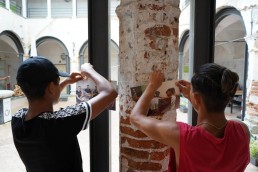Rights of Children on the Move
1. Italy | Promoting the Mental Health of Refugee and Migrant Children | Terre des Hommes Italy

Exhibition of the photos taken by migrant children, organised in Genoa. ©Tdh
Approximately 17,862 of the unaccompanied children from a migration background who arrived in Italy in 2023 were adolescent boys, who were forced to undertake an extremely dangerous journey to escape conflict, discrimination, climate change and misery.
Exposed to violence and threats at all stages of their migration journey, upon arrival in Italy, they are confronted with a reception and protection system that is often unable to offer adequate support for their well-being.
The “Adolescent Toolkit for Expression and Innovation” developed by UNICEF provides support for children and youth in this system. The toolkit is a resource package that includes tools, activities and materials, useful for structuring interventions for girls and boys, adolescents and young people, aimed at bringing about positive change through the development of “life skills”that are useful for dealing with problems and situations encountered in everyday life.
Terre des Hommes Italy was asked to test the toolkit with migrant and refugees adolescents for the first time in Italy and provide feedback to UNICEF for adaptations needed within this specific context. In 2023, Terre des Hommes’ teams in Italy operating in 39 reception facilities in Milan, Genoa and the province of Ragusa, relied on the toolkit to carry out group meetings, with an inclusive approach that focused on art, creativity, innovation and stimulating connection in the group and with the host community.
In addition to improving group dynamics, the activities aim to enhance the skills and strengths of each boy and to bring out vulnerabilities that require specialised individual care.
When Terre des Hommes team first met Yacoub in a community for unaccompanied migrant children and youth in Milan, he was 17 years old but looked older. He had come to Italy from Egypt to find work and did not understand why he had to stay in a host community, when he had always managed on his own, since starting to work when he was eight years old.
His family’s needs also weighed on him, that of earning as much as possible to repay the debts incurred for the trip and to ensure a comfortable life for his family who were left behind. A burden that was too heavy for a young boy like Yacoub, who later admitted that he never had a real childhood.
It is therefore understandable that at first he had a wary attitude and did not want to participate in group activities. But with some patience, the Terre des Hommes team managed to involve him, and help him to engage with other children. In this protected context, he was able to be a child like any other, with fears and dreams of his own. Yacoub dreams of returning to Egypt, marrying his fiancée and bringing her to Europe to live together happily.
After listening carefully to the other people in his group, it was also discovered that Yacoub was partially deaf, something he himself was not aware of. This had probably contributed to his isolation from others, and he was referred to undergo specialist examinations to improve his disability.
The activities reached a total of 477 adolescents, including 421 boys and 56 girls. 70% of adolescents were between 15 and 17 years of age and 20% were young adults. The majority of adolescents were Egyptian, followed by Tunisian and Bangladeshi.
Learn more about similar programmes here (in Italian).
